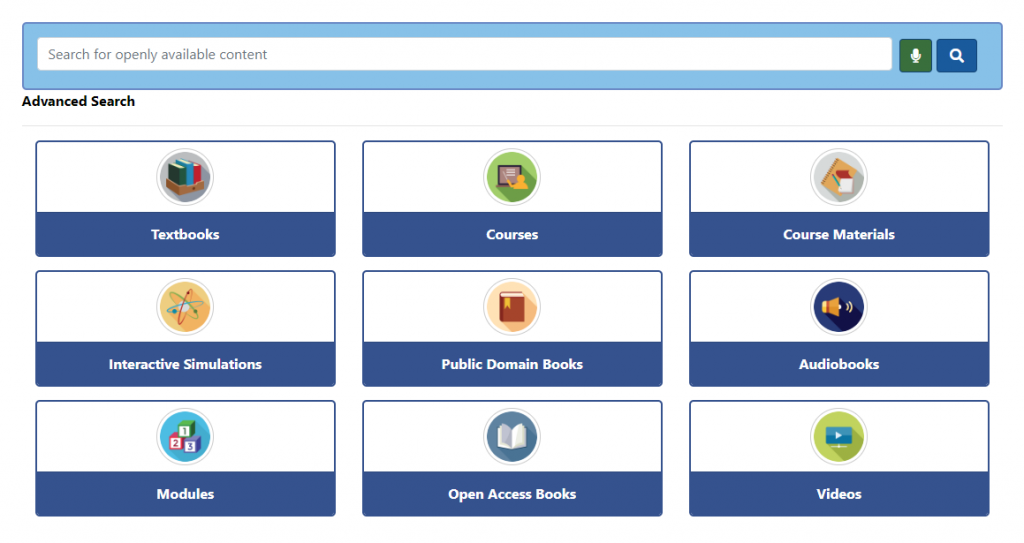Repositories and Search Tools
Ariana Santiago
By the end of this section, you will be able to:
- Identify four search tools for finding open educational resources.
- Identify at least two search tools for finding openly licensed media.
In the last chapter, we reviewed some strategies for finding OER. Below, a set of available repositories, search tools, and resources are listed to help you find the right OER for you.
Best Bets
When starting your search for OER, it’s best to begin in a place with a wide variety of options. The websites listed below each have a different focus, but they are good places to start if you aren’t sure what to look for.
- The Open Textbook Library is a great resource for finding open textbooks. If you want a textbook and nothing more, this is the place to start.
- BCCampus Open Textbooks collects resources created, reviewed, or adopted by instructors at British Columbia universities. Materials can be filtered by Accessibility as well as whether they have been adopted by BCCampus courses, include ancillary materials, or have been reviewed by faculty.
Federated Search Tools

SUNY’s Openly Available Sources Integrated Search (OASIS)
OASIS is a search tool that aims to make the discovery of open content easier by searching multiple sources for OER and other open content at once. OASIS currently searches for open content from 79 different sources and contains approximately 330,000 records.
George Mason OER Metafinder
The Mason OER Metafinder links to a wide array of open content, including open access books and articles, documents in the public domain, and OER. Because of its large breadth of resources, we recommend that you start your search with only a selection of the “OER-specific sites” checked, rather than all the materials it can include.
MERLOT
MERLOT is a project that was started in 1997 by the California State University system. The repository includes thousands of resources contributed by members, including original content and links to resources found through other platforms.
LibreTexts
LibreTexts is a 501(c)(3) non-profit organization committed to freeing the textbook from the limitations and costs of traditional textbooks. Our open and freely accessible LibreTexts provide a more engaging learning experience for students without the financial burden. The LibreTexts mission is to unite students, faculty and scholars in a cooperative effort to develop an easy-to-use online platform for the construction, customization, and dissemination of open educational resources (OER) to reduce the burdens of unreasonable textbook costs to our students and society.
Lyryx Learning
Lyryx publishes textbooks and supplements with Creative Commons open licenses, available with free access to everyone, and with a variety of permissions to adapt the material. We work closely with authors and subject matter experts to develop and maintain this high-quality content while also collaborating with the community by welcoming contributions or feedback. The Lyryx editorial team supports you in preparing materials for your course. We can customize material as needed and ensure that you have all the materials needed for your course.
Our open textbooks and supplements are available in a variety of formats including PDF, HTML, ePub, PowerPoint, and LaTeX. They can be downloaded at no cost and kept forever. We have a variety of instructor and student supplements available including slides (PowerPoint or Beamer), solution manuals, and videos. Source files are available upon request.
Lyryx offers editorial services for those courses using its software, including implementing adaptations of the content. Lyryx also provides its educational software to support other creators of open content such as Openstax.
EdTech Books
At EdTech Books, we believe that knowledge should be free, and that educational technology should lead the way! We provide high-quality textbooks to students at zero cost. Each year, we save students hundreds of thousands of dollars, all while providing robust learning experiences.
Teachers can experience peace of mind knowing that students have access to high-quality textbooks from day one of class. In addition, most of our textbooks can be remixed, meaning that teachers can edit, rearrange, and add content to the textbooks to meet student needs.
The EdTech Books platform allows authors to get their open educational resource (OER) textbooks published and to reach a larger audience. The platform is packed with features, including an intuitive interface with simple editing, PDF downloads of every book and chapter, detailed analytics, and much more! All for free!
Institutional Collections
Institutional repositories (IRs) aren’t just for sharing copies of research articles and student theses. They can also be used to store and share OER. Although not every college shares OER through their institutional repository, the colleges below do share collections of OER specific to their institution:
Subject-specific Repositories
Some open educational resources are shared through subject-specific repositories. A few notable examples of this type, including open publishers that specialize in one discipline, are listed below:
OER by Course
Some colleges choose to share information about which OER their instructors assign in courses. These lists can give you a good idea of what other instructors in your discipline have adopted and what they think of their adopted resource (if they have provided a review).
Open Content (not explicitly OER)
Not all open content is made to be used in the classroom, but that doesn’t mean you can’t integrate them into your course. Open access book chapters and openly-licensed media can be great additions to your course.
Open Access Publishers and Repositories
CC-licensed Media


